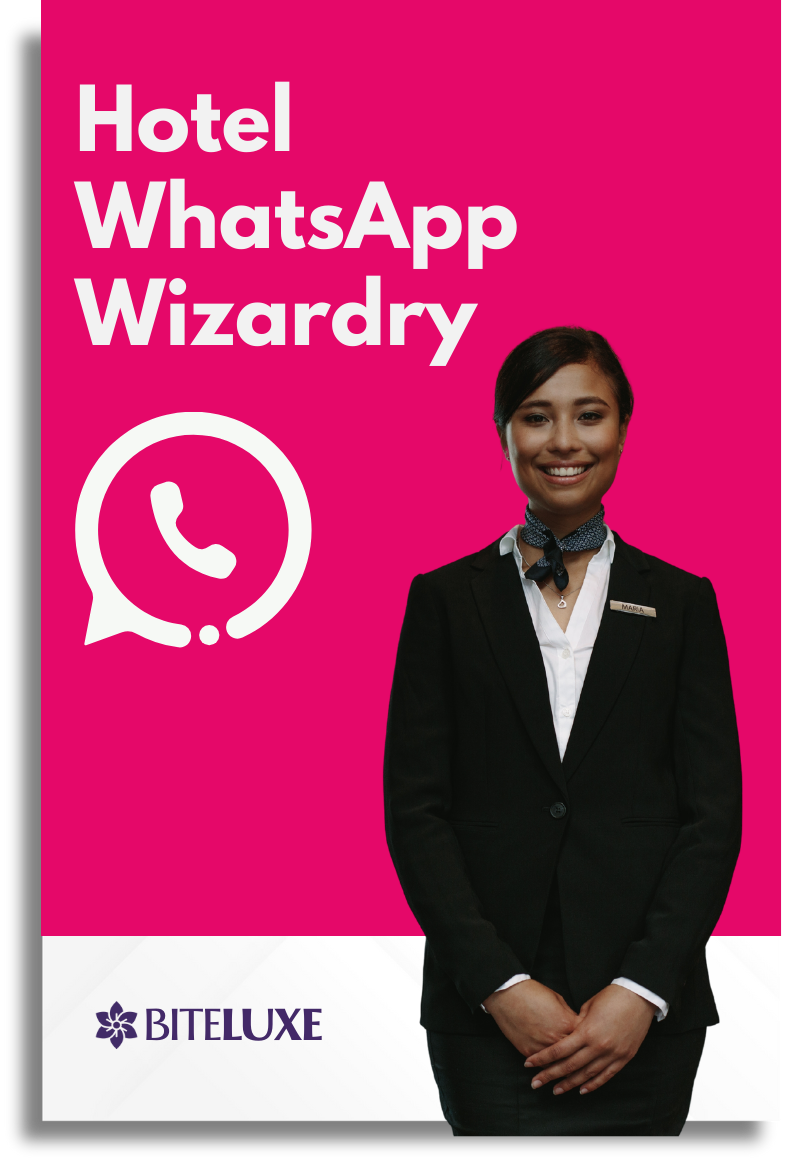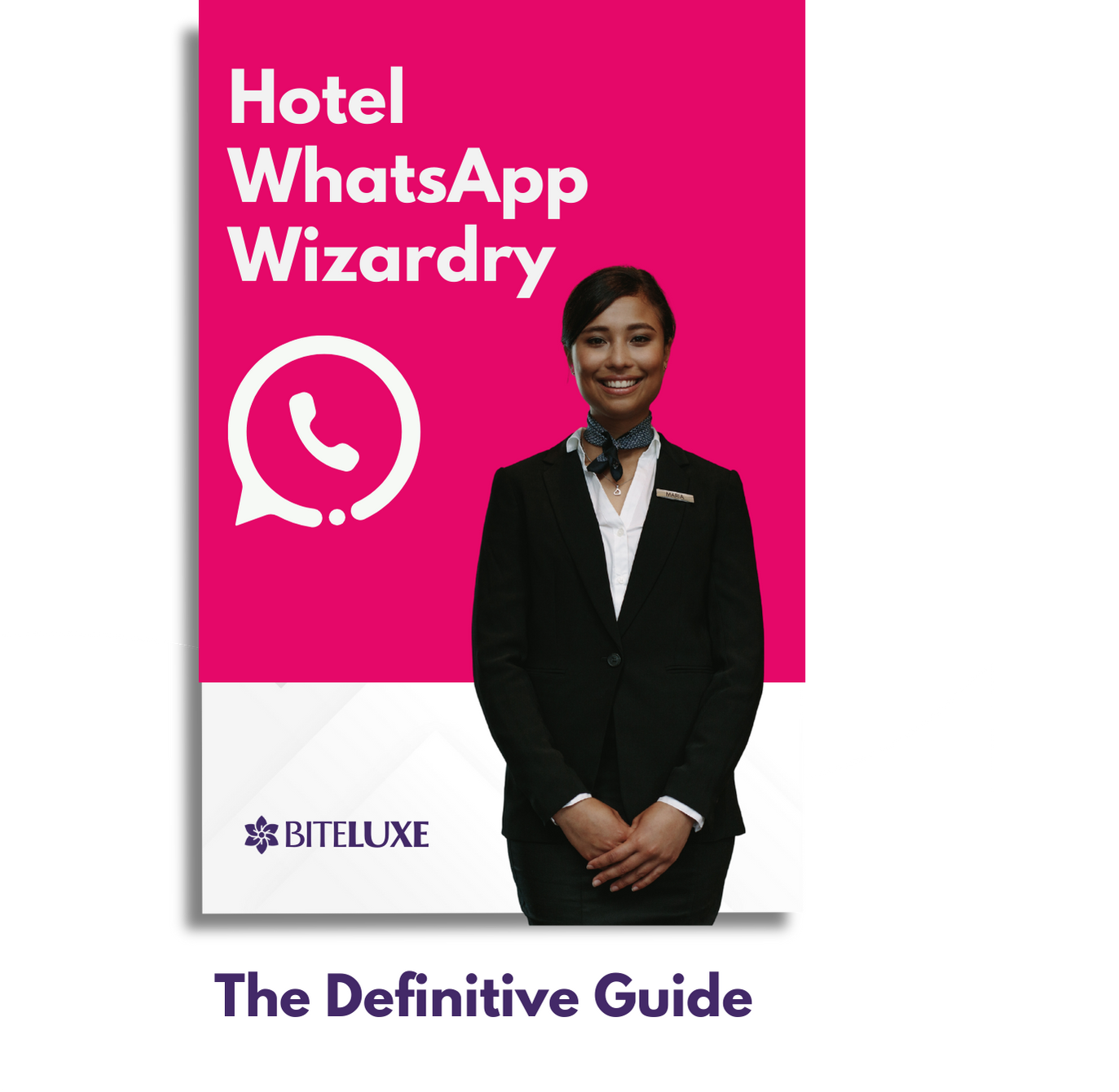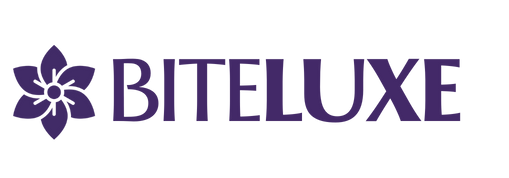The Biteluxe Blog
Short, sharp ideas on the tiny psychological shifts that lift guest happiness - and your revenue along with it.
The Biteluxe Blog
Bites of wisdom focused on improving the guest experience and generally making your guests happier

Why Hotel Upsells Work Better Through WhatsApp Conversations
Most hotels already have the ability to transact through a booking engine, guest portal, or mobile web app.
Yet the real challenge isn’t technological, it’s psychological.
Every guest decision moves through three psychological stages: from an underlying need, to awareness of a solution, to taking action.
For example, a guest mentions they’re celebrating something special. The hotel recognises the occasion and suggests a thoughtful gesture such as flowers or champagne on arrival.
The guest can then confirm in a single tap that opens directly into the hotel’s app or web checkout.
Most hotels have the last part covered. Fantastic.
What’s often missing is the ability to recognise when guests have a need and to bring the right solution to their awareness at the right time.
From over 10,000 guest conversations, we’ve seen upsell offers perform up to 3x better when delivered at the right moment in a conversation compared with the same message sent as a static offer.
The quick insight is this - it doesn't pay to send every single available upsell to every guest. Context is key, for both guest satisfaction as well as revenue uplift.
Awareness Happens in Context
People act when motivation, ability, and a prompt align within context.
That’s why channels matter. Each one serves a distinct role in the guest journey:
Low-cognitive-load instant messaging (for much of the world this is currently WhatsApp, and in the US often iMessage) is ideal for relationship building and discovery.
It creates conversation, reveals intent, and drives awareness of what’s possible during a stay. There’s nothing magical about WhatsApp itself - it just happens to be today’s low-friction, low-effort conversation channel of choice.
Web and app platforms are designed for transactions. They allow guests to complete bookings or purchases quickly and securely.
Email excels at record keeping. Guests turn to it for confirmations, itineraries, and post-stay communication.
Email has an average open rate of 25%, while low-friction messaging channels are opened by around 95% of recipients.
More importantly, conversational messages in these environments can convert up to 14% of upsell offers compared with roughly 1.2% via email.
Email inbox effectiveness is continuing to decline as consumers accrue subscriptions - it's a noisy place.
In contrast, instant messaging feels effortless and familiar. It is a low-cognitive-load environment where decisions happen naturally.
For 5-Star Hotels: Conversation, Not Campaign
Guests staying in a luxury property don’t want generic offers. They expect service that anticipates their needs.
Static broadcast messages on messaging platforms feel mechanical and impersonal. Luxury hotels should treat these channels as a conversational concierge:
“We noticed you’re arriving early. Would you like your room ready by noon so you can relax straight away?”
This isn’t selling. It’s serving. Guests are more likely to respond because the offer feels timely, personal, and helpful.
Transaction: Where Action Happens
Once awareness is established, the transaction environment has to be frictionless.
Research and testing consistently show that simplified, mobile-first checkouts improve conversion by around a third (Shopify).
For the most part, PMS-enabled checkouts and 3rd party booking engines do a pretty good job.
When instant messages deep-link directly into web-based apps or checkout pages, guests can complete bookings in one tap. It’s a seamless bridge between intent and action.
Email still plays a valuable role here. It remains the best channel for confirmations and itineraries, where guests instinctively look for records.
Email inboxes also have superior filtering and search capabilities, making it easy for guests to retrieve booking details or receipts long after their stay - something messaging platforms aren’t designed for.
The takeaway is clear: creating a seamless guest experience means letting each channel do what it does best - messaging for discovery, web for action, and email for reassurance - all working together in flow.
How to Implement WhatsApp for Discovery
You don’t need automation to start.
A manual WhatsApp conversational approach works well if your team can do it consistently.
We recommend setting aside around 16 minutes of staff time per guest to identify needs, suggest personalised options, and help them transact.
Example workflow:
Before arrival: Send a short message: “We’re looking forward to welcoming you. Are you celebrating anything special?”
Listen for cues: If it’s an anniversary, have a list of relevant upsells for front-of-house to reference
Offer value: “Would you like a bottle of champagne waiting in your room?” or “We can arrange flowers from our local florist.”
Make it actionable: Add a link to your booking page or payment form.
Respond quickly: Guests expect a fast reply; delay loses trust.
You can also make contact effortless by adding a QR code guests can scan at check-in. This lets your front-of-house team communicate throughout their stay - useful to give guests an exclusive line of communication straight to the front desk.
To generate one, use the format:
Replace the Xs with your hotel’s messaging number and customise the greeting text
A Google or GPT search will bring up many QR code generators, which you can use to create one from this link.
Note: Ensure GDPR compliance. Guest messages should remain service-based unless explicit marketing consent has been given.
Or Let an Expert Do It for You
Rather than managing this manually, you can partner with an expert guest experience agency like Biteluxe.
A dedicated Guest Experience Strategist will learn your hotel’s tone of voice, brand values, and guest profiles, and design conversations optimised for your goals - whether that’s increasing diner conversions, upselling experiences, or improving guest satisfaction.
Biteluxe handles all the technical setup, AI training, and integration, so your team can focus purely on hospitality.
When a guest interaction needs a human touch - for example, a complaint or an urgent request - the AI instantly alerts your front-of-house team, allowing them to jump straight into the conversation within the same messenger thread.
This approach combines automation with authentic service, ensuring that your guests always feel known, understood, and cared for.
The Takeaway
Having a web app or booking link means guests can transact. Instant messaging ensures they want to.
By bringing awareness at the right time, in a trusted environment, with your brand’s tone of voice, you turn convenience into connection and connection into conversion.
Deep Dive Recommendations
BJ Fogg – Tiny Habits: The Small Changes That Change Everything
Daniel Kahneman – Thinking, Fast and Slow
Shopify – The State of Commerce Conversion 2024
Meta Business Insights – Messaging Trends and Consumer Behaviour 2024
Case Studies
How conversational excellence translates directly into F&B, upsell growth, increased guest satisfaction and time savings.
Knowledge Hub
Practical guides on WhatsApp, AI concierge, F&B messaging and guest journey optimisation - built from real hotel results.
The FREE Hotel General Manager's Guide
Learn how to increase the quality of guest experiences with WhatsApp in Biteluxe's free e-book, Hotel WhatsApp Wizardry.

The FREE Hotel General Manager's Guide
Learn how to increase the quality of guest experiences with WhatsApp in Biteluxe's free e-book, Hotel WhatsApp Wizardry.


